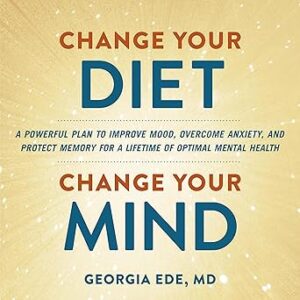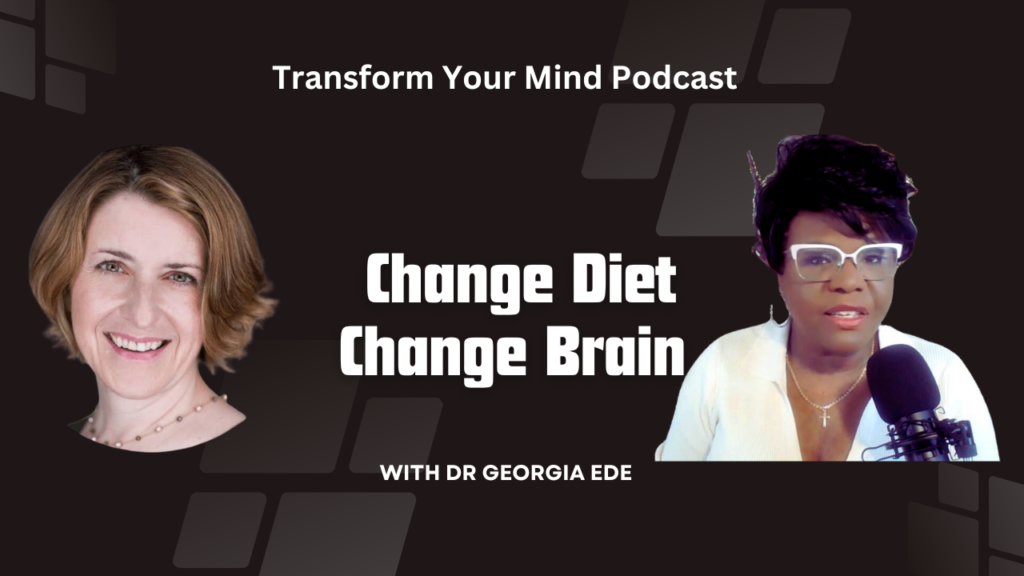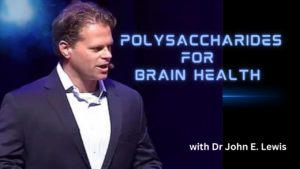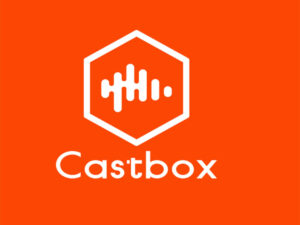Myrna Young and Dr. Georgia Ede discuss the transformative power of diet on brain health. Dr. Ede, a Harvard-trained psychiatrist specializing in nutrition science, links dietary choices to mental health benefits, including improved mood and reduced anxiety. They explain the importance of animal-based proteins for complete nutrition and how reducing refined carbohydrates can stabilize blood sugar and insulin levels, aiding in overall brain function. They consider common mental health medications and advocate for food-first approaches to lasting mental well-being. Download the podcast for science-backed insights on optimizing brain health through diet.
Download the podcast here:
Key Takeaways
The foods we choose have profound impacts on brain health, and dietary changes can alleviate mental health issues when medications fall short.
Animal proteins offer superior nutritional benefits for brain health compared to plant proteins, which often lack essential amino acids.
Understanding and managing insulin levels is crucial for both mental and physical health, and dietary measures can significantly influence insulin resistance and metabolic health.
The Profound Impact of Diet on Brain Health
In an enlightening discussion between life coach Myrna Young and Dr. Georgia Ede, a Harvard-trained psychiatrist specializing in nutrition science, the conversation dived deep into how dietary choices profoundly affect brain health. Dr. Ede shared valuable insights from her extensive clinical experience and research, emphasizing the potential of food to not only improve but sometimes fully heal mental health issues where medications often fall short.
“The most powerful way to change your brain chemistry is with food,” said Dr. Ede. “That’s where the brain chemicals come from in the first place.”
This perspective opens new avenues for those struggling with mental health conditions like anxiety, depression, bipolar disorder, and even more severe conditions such as schizophrenia.
Sponsored Ad
What if you could take a weekly shot to lose weight—and keep it off?
If you’ve heard of Ozempic or Wegovy, you’ve probably heard three things: they’re effective, but they’re expensive, and they’re hard to get. That’s where Ro comes in.
- Through Ro, you can access prescription compounded GLP-1s with the same weight-loss ingredient as brand-name GLP-1s at a fraction of the cost.
- Go to RO.CO/TRANSFORM
- Memberships start at just $99 for your first month. Medication costs are separate.

Nourishing Your Brain with Essential Nutrients
Importance of Animal Proteins
A significant portion of the conversation centered around the role of animal proteins in brain health. Unlike plant proteins, animal proteins contain all the essential amino acids that our brain needs to function optimally.
“If you feed the brain the nutrients it needs, it’ll work better,” Dr. Ede explained. “The animal foods are the ones that are the most nutritious and least risky for your health.”
She stressed that while plant-based diets are often praised for their health benefits, they often fall short in providing complete proteins and important omega-3 fatty acids, specifically DHA and EPA, which are crucial for brain function. In contrast, animal products like meat, seafood, eggs, and poultry naturally provide these essential nutrients.
What Happens Without These Nutrients?
When brain does not receive these essential nutrients, it can result in various cognitive issues. For instance, an iron deficiency in women, which is common, can lead to problems with neurotransmitter synthesis and overall brain energy production. Dr. Ede pointed out:
“Iron is essential to brain function. If you have iron deficiency, you don’t just have a blood problem, you have a brain problem.”
Sponsored Ad
The Science Moms are a non-partisan group of scientists who are, like many of you, moms.
Whether it’s understanding the real cause of extreme weather or simply talking about it with your friends and family, the Science Moms want you to know that a better future for our kids is possible. Human-made problems require human-made solutions, and no one is more equipped and motivated to lead the charge than our nation’s millions of moms.
Science shows us pollution is causing UNnatural disasters that are making our world more dangerous. That’s why I’m joining the millions of moms who are taking action to protect all we love. Join us at ScienceMoms.com

Protecting Your Brain Health from Harmful Substances
The Damage Caused by Refined Carbohydrates
Protecting the brain involves avoiding substances that can cause harm. Among the chief culprits are refined carbohydrates and vegetable oils. The consumption of sugars, flours, cereals, and fruit juices can significantly damage brain cells and disrupt its functioning.
“Sugars, flowers, cereals, fruit juices, these refined carbohydrates are the main drivers of mental health problems,” Dr. Ede noted.
These substances lead to inflammation, oxidative stress, and insulin resistance—all factors that negatively impact brain health. By eliminating these foods, you help to protect your brain from these harmful effects, thereby improving your mental health.
Sponsored Ad
As we head into Fall, I invite you to shop at Quince.com/myrna for your fall wardrobe update. Quince offers timeless and high-quality fall clothing I adore. Make switching seasons a breeze with Quince’s high-quality closet essentials. Go to Quince.com/myrna for free shipping on your order and 365-day returns.

Understanding Insulin Resistance
Dr. Ede highlighted that high insulin levels impede fat burning, culminating in physical and mental health issues. This understanding is critical:
“If your insulin levels are too high, you will not be able to lose weight. The best way to lower your insulin levels is by lowering your carbohydrate intake.”
Even for people following a, plant-based diet, managing carbohydrate intake to regulate insulin levels remains crucial for maintaining overall health, including brain health.
Sponsored Ad
With a community of 150 million people, GoFundMe is the leader in fundraising, they help people help people. You can withdraw your funds at any time, even if you don’t reach your goal.
So, the next time you need help head over to GoFundme.com/transform – and tap the green “start” button. Asking for help is the smart thing to do.
It’s free to start, free to manage, and designed to help you reach your goals
Start your fundraiser today through my special URL: GoFundMe.com/TRANSFORM
As a Transform Your Mind listener you will get a FREE coaching session with a GoFundMe expert – whether you’re starting a fundraiser today or set up for future.

Energizing Your Brain with Balanced Glucose Levels
Monitoring Glucose and Insulin Levels
One of the actionable steps Dr. Ede recommends is to monitor fasting glucose and insulin levels to identify any signs of insulin resistance, which is a precursor to more severe metabolic conditions.
“You want to know how much insulin your body is pumping out to keep your glucose normal, because that high insulin level is the problem,” she emphasized.
By understanding and managing these levels, you can prevent the cascading negative effects on your mental and physical health. Dr. Ede highlighted the importance of triglyceride levels as well:
“You can drop your triglycerides 100 to 150 points within weeks if you drop your carbohydrate intake.”
Sponsored Ad
Transform Your Mind is sponsored by BetterHelp.
Give online therapy a try at betterhelp.com/TYM and get on your way to being your best self.”
When you feel like you have no time for yourself, non-negotiables like therapy are more important than ever.
- It’s helpful for learning positive coping skills and how to set boundaries; it empowers you to be the best version of yourself; it isn’t just for those who’ve experienced major trauma; etc.
If you’re thinking of starting therapy, give BetterHelp a try.
- It’s entirely online. Designed to be convenient, flexible, and suited to your schedule.
- Just fill out a brief questionnaire to get matched with a licensed therapist, you can switch therapists any time for no additional charge.
- Never skip therapy day, with BetterHelp.
- Visit Betterhelp.com/TYM today to get 10% off your first month.

The Broader Implications
Maintaining balanced glucose levels isn’t just about physical health; it has profound implications for mental well-being. Unstable blood sugar levels can lead to mood swings, anxiety, and even cognitive decline over time. By focusing on a diet that keeps these levels stable, you contribute to a healthier, more energetic brain.
Sponsored Ad
This Year take your business to the next level with a Shopify online store. Whether you are Selling a little or a lot Shopify helps you do your thing, however you cha-ching.
- Shopify is the global commerce platform that helps you sell at every stage of your business.
- Sign up for a one-dollar-per-month trial period at shopify.com/transform
- Go to shopify.com/transform now to grow your business–no matter what stage you’re in.

Comprehensive Strategies for Improved Mental and Brain Health
This intense conversation between Dr. Georgia Ede and Myrna Young underscored the profound connection between diet and mental health. The key themes were:
Nourishing Your Brain: Prioritizing animal proteins and essential nutrients like omega-3 fatty acids and iron.
Protecting Your Brain: Avoiding refined carbohydrates and harmful oils to reduce inflammation and oxidative stress.
Energizing Your Brain: Monitoring and managing glucose and insulin levels for stable mental and physical health.
Dr. Ede’s approach offers a holistic, food-first strategy to mental health management. Given that mental health issues are often an interplay of various factors, including diet, her insights are not just valuable but potentially transformative.
Dr. Ede encapsulates this holistic mindset with a promise of hope: “If you take care of your brain, the brain will take care of you.” And indeed, by nourishing, protecting, and energizing our brains, we foster a healthier, happier, and more balanced life.

Further insights and detailed strategies can be found in Dr. Ede’s book, “Change Your Diet, Change Your Mind,” which offers a comprehensive guide to using nutrition as a powerful tool for mental health. This book is an essential resource for anyone looking to understand and improve the intricate relationship between diet and brain health.
Additional Resources
For more information, visit Dr. Georgia Ede’s website Diagnosis Diet or follow her on social media: Instagram, Twitter, and Facebook.










One Response
There are several types of products aimed at improving brain health, including supplements, functional foods, and cognitive training tools. Brain health need product.click here